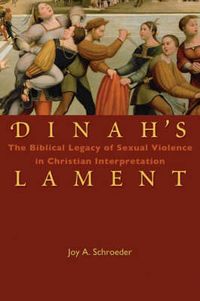
Dinah's Lament: The Biblical Legacy of Sexual Violence in Christian Interpretation
Dinah's Lament studies the ways Christians have read six biblical narratives about sexual violence, using biblical commentary, homilies, and devotional writings as a window into the history of the church's attitudes about rape. Schroeder analyzes the patterns of Christian interpretation ... from the early church through the Reformation, and shows that traditions of interpretation are often more disturbing and horrifying than the texts themselves. Her work raises important questions about the way Christian readers continue to shield the Bible from criticism and to reinforce patterns of subjugation, silencing, and violence against women. An introduction addresses the physical, emotional, and social effects of rape and sexual violence on women in the early church, Middle Ages, and Reformation, and summarizes Christian patterns of interpretation including allegorical, moral, and literal- historical approaches to the Bible. Subsequent chapters discuss early Christian accounts in which virgin martyrs were divinely protected from rape; interpretations of Genesis 34 that effectively blamed Dinah for her own rape (with the remarkable exception of Martin Luther); the importance of Christian voices, especially medieval women like Hildegard of Bingen and Hrotswitha of Gandersheim, that insisted on the innocence of rape victims and lamented the violation of women's bodies; and more.
Utgiven: 2007
ISBN: 9780800638436
Förlag: Fortress Press
Språk: Engelska
Sidor: 317 st
Dinah's Lament studies the ways Christians have read six biblical narratives about sexual violence, using biblical commentary, homilies, and devotional writings as a window into the history of the church's attitudes about rape. Schroeder analyzes the patterns of Christian interpretation ... from the early church through the Reformation, and shows that traditions of interpretation are often more disturbing and horrifying than the texts themselves. Her work raises important questions about the way Christian readers continue to shield the Bible from criticism and to reinforce patterns of subjugation, silencing, and violence against women. An introduction addresses the physical, emotional, and social effects of rape and sexual violence on women in the early church, Middle Ages, and Reformation, and summarizes Christian patterns of interpretation including allegorical, moral, and literal- historical approaches to the Bible. Subsequent chapters discuss early Christian accounts in which virgin martyrs were divinely protected from rape; interpretations of Genesis 34 that effectively blamed Dinah for her own rape (with the remarkable exception of Martin Luther); the importance of Christian voices, especially medieval women like Hildegard of Bingen and Hrotswitha of Gandersheim, that insisted on the innocence of rape victims and lamented the violation of women's bodies; and more.
Begagnad bok (0 st)
Varje vecka tillkommer tusentals nya säljare. Bevaka boken så får du meddelande när den finns tillgänglig igen.



